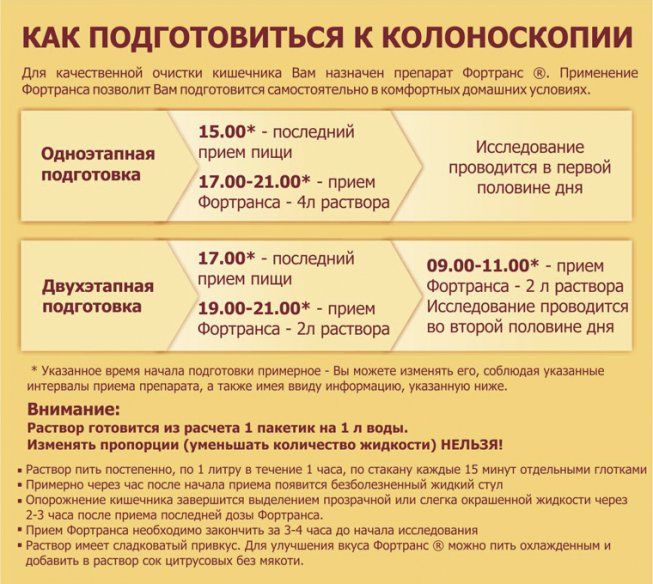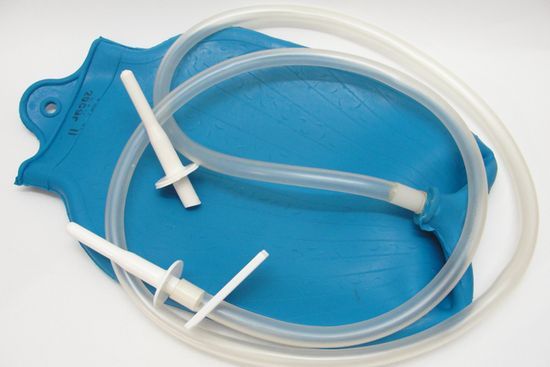Light fluid before colonoscopy. What does proper preparation for a colonoscopy with Fortrans mean?
Intestinal colonoscopy is a method for diagnosing the condition of the inner surface of the colon, carried out using a special device - a fiber colonoscope. To receive reliable result analysis, proper preparation for colonoscopy is important, which includes several stages and rules.
You will have to prepare for the procedure at home, using certain manipulations and medications (diet, cleansing the body, using laxatives).
Your doctor will give you precise and specific instructions. Some recommendations are general. Thus, no solid foods will be consumed 1-2 days before the colonoscopy. Only pure fluid intake is allowed. The day before the colonoscopy, a powerful laxative is given that will generate numerous fluids. Therefore, special attention should be paid to hydration.
An alternative to colonoscopy in the future?
Although they are rare, complications of colonoscopy include: Bowel perforation: People at risk are people with diverticulitis, colon disorders, surgical adhesions after the pelvis. Dysbiosis and other intestinal imbalances: caused by the elimination of pre-procedural intestinal contents by aggressive laxatives.
True or false about colon cancer
However serious problems with intestinal transit, apparently unexplained anemia, weight loss, occult bleeding, or abdominal pain are possible symptoms colon cancer. My father and my sister were both diagnosed with colon cancer. Yes and no. If you have a parent, child, sister or brother with colon cancer, your risk of developing colon cancer is two to three times higher than the general population. According to statistics, up to 5% of colon cancer cases are hereditary. Polyps are tissue secretions that appear in the colon. Most polyps are not cancerous, but some may become cancerous over time. Eliminating precancerous intestinal polyps through colonoscopy reduces the risk of developing colon cancer by 70%. Age has nothing to do with colon cancer risk. The risk of colon cancer increases as you get older. More than 90% of colon cancer cases are diagnosed after age 50. For this reason, screening for colon cancer is performed after this age. If you have a family history of colon or intestinal polyps, talk to your doctor and start screening before this age. A family history of intestinal polyps or colon cancer means a higher risk. Can diet increase the risk of colon cancer? Diet with high content fat, processed foods, and red meat may increase the risk of colon cancer. Reduce your consumption of these foods! A diet rich in fruits, vegetables, whole grains, seeds and nuts may reduce your risk of cancer. Maintaining a healthy weight and moving physically can reduce your risk of developing cancer.- Complications of anesthesia.
- In most cases, colon cancer has no symptoms.
- Is it true.
- In most cases, polyps and colon cancer have no symptoms.
- For this reason, screening is very important.
The procedure always causes unpleasant emotions, but it is absolutely painless and today is the only one in which it is possible to identify malignant tumors intestines in the early stages.
With the help of FCS or fibrocolonoscopy, diseases such as polyps, inflammatory processes intestines, ulcers. Do not neglect this study and preparation for it; if prescribed, do not risk your health.
This is why doctors turn to us in this regard and focus on the most relevant investigation. It is also possible to take biopsies from tumors in the upper digestive tract. An endoscope is a long, thin, flexible tube that provides a light source and a small video camera. The images are constructed on a monitor where they are analyzed by a doctor. The doctor should be informed if the patient has allergies, heart or lung complaints, or is diabetic. In addition, the anticoagulant drug should be discontinued several days before the procedure.
Indications and contraindications for examination
Colonoscopy of the intestines is a test that your doctor may prescribe if you suspect various types inflammation, dysfunction or disease of the colon, therefore careful and proper preparation for this procedure, carried out mainly at home, is important.
The risks of increased digestive endoscopy are minimal if therapeutic procedures are not performed. In general, complications of upper gastrointestinal endoscopy are rare. Overall, the satisfaction rate is less than 1 in 500 cases. A colonoscopy is an exam in which a doctor examines the colon using an instrument called a colonoscope. A colonoscope has a small camera attached to a flexible tube.
Why perform a colonoscopy. A colonoscopy may be done for the following reasons. Abdominal pain, changes in bowel habits or weight loss pathological changes with sigmoidoscopy tests or x-ray Anemia due to blood iron deficiency in the stool, long breaks between sitting exam for research medical condition such as polyps or colon cancer analysis inflammatory disease intestines. A sedative will be given intravenously to help you relax.
Indications for colonoscopy:
- Suspicion of Crohn's disease initial stage and malignant intestinal tumors;
- Bleeding in the gastrointestinal tract;
- Renewal of intestinal obstruction;
- Detection;
- Anemia;
- Unexplained pain in the large intestine;
Colonoscopy is performed additionally, in order to recreate the full picture, if chronic diseases Gastrointestinal tract, with active and causeless weight loss of the patient. Also, fibrocolonoscopy will be useful for elderly people in order to exclude the presence of cancerous tumors in the intestines.
You should not feel any discomfort. You will be awake during the test, and you may even be able to speak, but you probably won't remember anything. There is also the option of complete anesthesia. You will remain on your left side with your knees bent towards your chest. The colonoscope is inserted through the anus and pulled out through the colon, slowly moving towards the last part of the small intestine. For better review and create a kind of surface pressure, air is introduced at the end of the pipe. Suction may be used to remove fluid or stool.
 Contraindications to the procedure:
Contraindications to the procedure:
- The patient has an active stage of ulcerative colitis or Crohn's disease;
- The procedure is not prescribed for pregnant women;
- The patient's state of shock;
- The patient has pulmonary and heart failure;
- Peritonitis, myocardial infarction;
The exam is usually delayed during a colonoscopy. The doctor may take tissue samples from the end of the forceps from the colonoscope. He may remove polyps or may undergo specialized procedures such as laser therapy, for example. You will need to completely cleanse your colon. If your intestines are not clean, then it is possible that some problems may not be perceived correctly. Your doctor will provide tips and alternatives for cleaning. This may include an enema, avoiding solids for 2-3 days before the test, laxatives, etc. You will be asked to drink plenty of fluids 2-3 days before the test.
The purity and reliability of the result of the procedure can only be obtained if you cleanse the intestines correctly before colonoscopy. Indicators of correctly done work and your body’s readiness for FCS are lightness and a feeling of emptiness in the abdomen and stomach, stool that has a light yellow color and an unsteady consistency.
Insufficient preparation for the procedure, non-compliance with the diet and poorly cleaned intestines prevent a full examination, and even the presence of small particles in the stool requires a specialist to assess the condition of the inner surface of the intestine, not to mention the fact that the presence feces complicates the advancement of the fibrocolonoscope.
Coffee fruit juices. . You avoid aspirin, ibuprofen, or other anticoagulants for several days before the test. You will need to stop taking iron tablets a few days before the test because the iron stool is darker than usual, making the procedure more difficult. In general, any medical treatment What you follow with your doctor will need to be discussed first to determine if the procedure is affecting you.
The drugs will make you drowsy, so most of the time you won't feel any discomfort and you won't remember the practice test. Severe bleeding during the procedure or after removal of polyps drilling or rupture of the colon wall, which will require surgery to repair the infection from the side of the seat. You will need to stop taking iron tablets or liquid a few days before the test if your doctor says it is okay to continue.
You need to prepare properly and in advance for the procedure; for this you will need special products for a slag-free diet, laxatives, as well as disposable underwear made of non-woven material with a special hole.
Be patient as the body cleansing needs to begin. 5-6 days before the colonoscopy. Foods with seeds and grains are completely excluded from the diet, and a couple of days before the procedure the patient must follow a low-calorie diet.
Metals can turn your stool black and dark, making it difficult for a doctor to see inside the intestines. When we have advertising ahead, it's good to be careful. We are bombarded with aggressive advertising for so-called colon detoxification products, which are really just over-the-top mild laxatives.
Why do these “specialty” products cost ten times more than the same ingredients purchased from Plafar? Because it produces "miraculous benefits" based on absurd hypotheses revolving around the concept of mucous plaque, a fictitious deposit on the intestinal wall, the source of all evil.
The next step will be drugs to prepare the patient’s intestines: Forject, which give an excellent laxative effect. And on the eve of a colonoscopy, it is advisable to cleanse the intestines with an enema.
Be sure to tell your doctor about any medications you are taking for additional advice before your FCS procedure.
Physiology of the colon: mucus and intestinal motility
Most of the nutrients we get from food are absorbed small intestine, which has a specialized structure. So what's left behind the colon? He does four great features. Firstly, it deals with the absorption of large amounts of liquid and electrolytes, turning it into a liquid state small intestine solids or semisolids and absorption fatty acids short-chain from the fermentation of carbohydrates that have not been absorbed In the small intestine, such as cellulose, by bacterial microflora: this role is less important in humans, but herbivores are a very important source of energy.
Proper diet
The diet is an absolutely safe procedure and contains products aimed at saturating your body. useful substances and minerals, you will absolutely not feel pangs of hunger.

A low-calorie diet involves moderate and proper consumption of the following foods:
The "good" bacteria that live in the colon synthesize vitamin K, important in the blood clotting process, as well as other B vitamins. The colon tank has the function of preserving fecal matter, and removing its contents in the usual manner.
If we imagine our colon as a waste pipe, then we should see mucoid plaque as dirt that settles on that exhaust pipe. Attention dear readers, as you may well know, our colon is not a rigid tube like a drainage pipe that comes out of the sink, it is a functional and living organ! Of course, this observation is empirically proven simply because in most of the colon the chimney moves against gravity - think of the ascending colon!
- Meat: chicken, veal, rabbit meat, fish;
- Fermented milk products with low rate fat content;
- Buckwheat and rice porridge;
- Light soups and broths;
- Steamed vegetables (this rule also applies to meat dishes);
- Green tea, weak black tea, juices without pulp;
A slag-free diet will be a good start in preparing for the procedure. A couple of days before the intestinal colonoscopy from the diet are completely excluded the following food products:
A miraculous or completely justified process of human physiology? Let's see what's really going on. To protect itself from excess acidity due to stress, unhealthy foods, drug abuse, parasites, pathogenic bacteria, the body secretes mucus. And the more dangerous the substances absorbed, the more mucus is deposited. Excess mucus is not good at all. Over time, mucus becomes thick and hard, it enhances and interferes with the digestion process.
The mucous secretion of the gastrointestinal tract certainly plays an extremely important role. But not designed to counteract unhealthy lifestyles, but easy transport of food from oral cavity in the rectum for their digestion and absorption of nutrients. It also often contains enough bicarbonate to neutralize the acids involved in normal digestion. The epithelium of the colon has numerous secretory mucous cells. In fact, mucus is the main secretion of this segment.
- Raw fruits and vegetables;
- Hard cheese, sour cream, milk;
- Flour products and whole grain cereals;

The last meal must end in 15-20 hours before colonoscopy of the intestines. This diet involves switching exclusively to liquid nutrition.
Mucosal Secretion rate is regulated mainly by direct tactile stimulation of mucosal cells, but also by local nerve reflexes or intense stimulation of parasympathetic nerves. Mucus prevents direct contact between food particles and the intestinal mucosa, has a lubricating role and provides easy gliding, protecting the intestinal wall from potential esoteric or chemical injury. It also provides the adhesive environment necessary for the formation of fecal matter that needs to be eliminated and protects the colon from the possible action of existing bacteria at that level.
Clear broths are allowed, green tea, weak and sweet black tea, still mineral water.
When preparing for FCS and bowel cleansing, completely remove from your menu foods that increase the level of fermentation and gas formation: legumes, confectionery, carbonated drinks, raw vegetables (cabbage, apples). Proper diet will help prepare for the procedure, cleanse yourself of waste and toxins and improve metabolism.
Medication preparation
Preparations for colonoscopy are available to everyone, are available in pharmacies without a prescription, and in terms of the effectiveness of the result, this is the best means for cleansing the intestines. A variety of drugs to choose from will help you decide which laxative medication is right for your body.

| Preparation | Contraindications | Directions for use and dosage |
|---|---|---|
| Fortrans | Children under 15 years of age, narrowing of the lumen of the stomach, dehydration, kidney pathology in the patient, etc. | Dissolve the contents of one package in 1 liter of water. 1 liter of this solution per 15-20 kg of weight. During the day you need to drink 3-4 liters of solution. |
| Fleet Phospho-soda | The patient's age is under 18 years, renal failure, taking simultaneously with other laxatives, etc. | Take the drug twice a day after meals, following the instructions for use, on the day before the procedure. Dissolve the bottle in 120 ml. water, take orally and drink a glass of clean water. |
| Duphalac | The patient is allergic to fructose or galactose, increased sensitivity to the components of the drug, galactosemia, etc. | The dosage of the drug is prescribed individually based on the patient’s age. Should be taken 2 hours after meals. |
| Endofalk | Intestinal obstruction, active stage of colitis in the patient, presence of ulcers or erosions in the gastrointestinal tract, etc. | Take 200-300 ml orally. solution every 10 minutes. The total amount of solution drunk should be no more than 4 liters. |
| Forlax | Patient hypersensitivity to macrogol, children under 8 years of age, intestinal obstruction, Crohn's disease, ulcerative colitis, etc. | Take orally, 1-2 packets per day, preferably in the morning, once on the eve of the procedure. Or one sachet in the morning, the second in the evening. |
Using an enema: pros and cons
What else and how to prepare for an intestinal colonoscopy without taking laxatives? The simplest, most inexpensive and at the same time most inconvenient event is colon cleansing with an enema.

To carry out the procedure, you will need an Esmarch mug or a regular syringe.
If you are a supporter of this method, then do it the evening before the visit to the specialist and in the morning before the test. But remember, with the help of an enema, you do not completely cleanse your intestines, which can affect the FCS result obtained, and the preparation can be considered a failure.
Pay attention! An enema is contraindicated in patients with hemorrhoids, so as not to cause damage to the tip of the device.
An integrated approach to preparing your intestines for a procedure such as a colonoscopy will allow the doctor to reliably and correctly assess its condition inside. Do not under any circumstances refuse the procedure because of its “inconvenience”; the FCC is by far the most effective and efficient examination.
can give a positive result, subject to compliance with recommendations regarding preliminary preparation, carried out by analogy with the methods of cleansing that precede X-ray and endoscopic methods examinations. Without preparation, the results may not correspond to reality.
Preparing for a colonoscopy is mandatory!
There are two stages to go through:
- a slag-free diet is a prerequisite, without which it is impossible to get the right results;
- intestinal cleansing, carried out in various ways.
The preparatory stages should be completed in advance; you should not postpone diet and cleansing until the day of the procedure.
Residue-free diet before colonoscopy
The most common questions that arise when discussing a slag-free diet: what foods can be consumed, and what should be avoided without fail?
The category of waste foods includes foods that result in bulky stools and bloating. These products must be abandoned 3 days before the examination. The following foods should be excluded from the diet:
- fresh vegetables (carrots, white cabbage, onions, garlic, turnips, radishes, radishes, beets);
- millet, pearl barley, oatmeal;
- greens (spinach, sorrel);
- legumes (beans, peas, beans, lentils);
- nuts;
- black bread;
- berries (raspberries, gooseberries)
- fruits (apples, dates, oranges, apricots, peaches, grapes, raisins, bananas, tangerines);
- kvass, carbonated products;
- milk.
The following products can be consumed:
- fermented milk products;
- lean fish, beef, poultry;
- bakery products made from wholemeal flour.
The last meal of the day before the procedure can be no later than 12-00. You can drink plain and mineral water, tea. For dinner - exclusively tea. On the day of the colonoscopy, you can have breakfast only with liquid.
Enema for colonoscopy

Thorough cleansing of the intestines is a prerequisite, without which it is impossible to achieve a positive result. Until recently, the most common method was enemas. Many patients prefer this method to this day.
How to do enemas correctly?
Proper cleansing through enemas involves two stages:
- in the evening preceding the day of the procedure;
- in the morning before the colonoscopy.
In the evening, two cleansing procedures will be performed, at approximately 19-00 and 20-00, or the time will be shifted by several hours, depending on the patient’s daily routine. The minimum enema volume is 1.5 liters; intestinal lavage must be carried out until clean water appears.
To enhance the effect, you can take laxatives. For example, before washing, take 100 ml of a 25% solution of magnesium sulfate, 40 - 60 g of castor oil. It is recommended to take funds before 16-00. In the morning, the enema is also done twice: 7-00, 8-00.
The cleansing procedure through enemas has its pros and cons. The indisputable advantages of the method are its simplicity and minimal costs. The disadvantages of this method include inconvenience; it is quite difficult to carry out the procedure without outside help: it is necessary to control the flow of fluid and retain it in the intestines for a certain period of time.
Patients who have problems with cracks in the rectal mucosa or hemorrhoids should be careful when using enemas; there is a high probability of injury from the tip.
Recently, the use of a more gentle method of cleansing has been practiced: special laxatives, which are recommended to be taken according to certain regimens.
Fortrans drug for preparation for colonoscopy

The effect of the drug Fortrans is to cleanse the intestines without absorption into gastrointestinal tract, the product is removed unchanged. Preparation is extremely simple: a packet of product is diluted in 1 liter of water. For 20 kg of patient’s body weight – 1 liter of solution. There are two methods of using the solution:
- The drug is taken in the evening, starting from 15-00, 1 glass, at intervals of 1 hour;
- Half of the solution is taken in the evening, the rest in the morning.
The last time you should take Fortrans is 3-4 hours before the examination. The drug is intended directly for the cleansing stage preceding X-ray, endoscopic examinations, and operations on the colon.
Preparation with Duphalac
Duphalac belongs to the category of laxatives, is characterized by a mild effect on the body and effectively cleanses the intestines. 2 hours after the dietary lunch, the drug is started. 200 ml of the drug is diluted in 2 liters of water, the entire solution should be drunk within 2-3 hours. The drug begins to act after 1-3 hours, depending on the individual characteristics of the body. The main advantage of Duphalac is its mild action, eliminating painful sensations patient.
Preparation with Flit
Fleet is a drug that appeared relatively recently, its popularity is rapidly growing, many patients have been convinced of the effectiveness of the drug from their own experience.
Rules for preparation using the drug Flit
- Take in two doses.
- 45 ml of the product is diluted in half a glass of water and consumed immediately after breakfast;
- the second dose (45 ml) - in the evening after a diet dinner.
- If the patient has time, you can take another dose in the morning on the day of the examination, no later than 8-00.
- Breakfast and dinner should include only 1 glass of water.
- Lunch should be dietary and include no more than 750 ml of water.
- Each dose of Flit should be taken with 1-3 glasses. cold water, after taking the drug, the liquid can be consumed in unlimited quantities.
- Fleet begins to act approximately 30 minutes after administration.
Choosing a cleansing method
![]()
Modern medications designed to prepare for colonoscopy have many advantages compared to enemas, this has been confirmed by patients and doctors.
Regardless of which method of cleansing you prefer, the main thing is to follow the recommendations regarding the sequence of procedures and the volume of liquid.
Only high-quality cleansing can give results that are beyond doubt. The choice of cleansing method depends on several factors:
- Experience in performing enema procedures. If you plan to carry out the procedure yourself for the first time, it is better to refuse and give preference modern methods, excluding injury. If you have sufficient experience, you do not have to abandon the usual method of cleansing.
- Convenience of using modern drugs. Choice modern drug depends on the patient’s personal preferences and the characteristics of his body. Fortrans involves taking large amounts of fluid, this may cause gag reflex, nausea. and Duphalac are drugs with which preparation begins in the evening; accordingly, the patient must have sufficient free time. Flit is taken on the day of administration, the drug takes effect after a short period of time.
Each drug has contraindications, products intended for cleansing are no exception. Fit and Duphalac are strictly forbidden to be taken during pregnancy by people with diabetes. Castor oil should not be taken by patients suffering from gallstone disease.
Approximate cost of preparation
The most affordable method that does not require material costs is an enema. also has a low cost. Duphalac and Fortrans are more expensive, but the ease of use and effectiveness of the drugs fully justify the cost.
There is another drug that is in quite high demand - Lavacol. It should be noted that currently most clients prefer Fortrans. Before preparing for a colonoscopy, it is recommended to seek qualified advice from the doctor who will perform the procedure, especially if the patient has no experience in cleansing the intestines; it is also necessary to take into account the individual characteristics of the body.
In conclusion, it is worth saying that be sure to consult with the doctor who prescribes the examination for you () - he will certainly recommend the most suitable way for you to prepare for the procedure.
You can see how a colonoscopy is performed in the video:
Tell your friends! Tell your friends about this article in your favorite social network using social buttons. Thank you!
